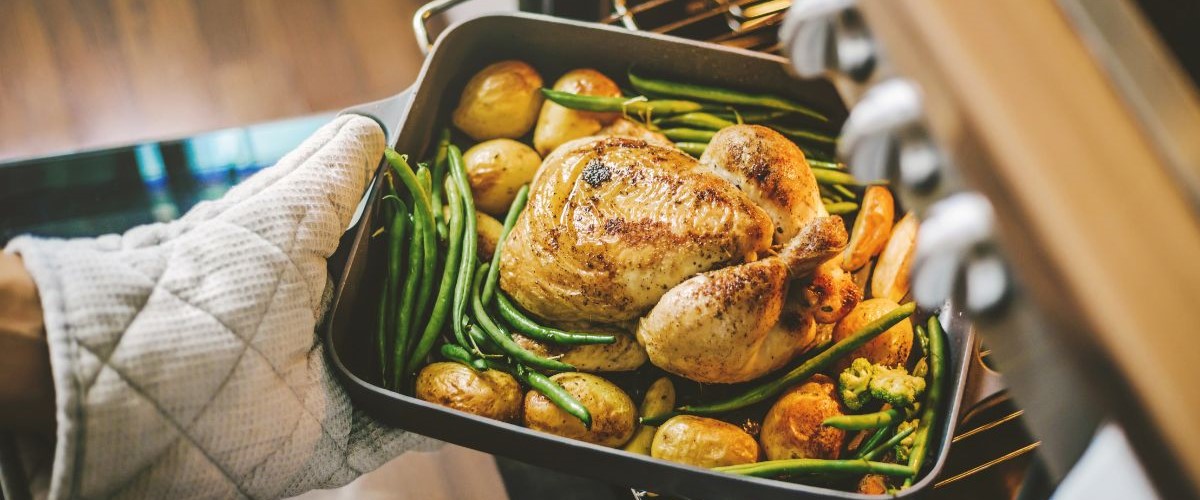How to eat cheap: 5 tips to stay healthy on a budget
Eating healthily when money is tight can be tough, especially these days. Here's how to keep costs down while having happy, healthy bellies

There’s a common belief that if you are eating on a budget, you have to sacrifice nutritional value – but that doesn’t have to be the case.
However, with the price of food and non-alcoholic beverages up 26% between December 2022 and December 2023, eating nutritiously and affordably feels like it has never been more challenging.
The cost of food can quickly add up, making it all-the-more tempting to opt for cheaper, more convenient foods that are often more processed and less healthy.
“The cost-of-living crisis means that our salaries are not keeping in-line with inflation,” adds Prema Sohun, Vitality’s Technical Marketing Manager.
“That’s why when people do their weekly food shop, they’re not buying as much today.” The good news is that with just a little bit of planning and a few tips and tricks, you may surprise yourself with just how far your supermarket budget can go.
Plan your recipes
Planning your meals for the week ahead not only removes temptation for an expensive takeaway but also helps you keep on track to stay healthy.
“Planning meals can help with buying what you need or buying things in bulk – like pasta and rice,” says James Vickers, Vitality expert and nutritionist. So, if you know cash is going to be strapped, meal planning can really pay off.
For example, if your favourite protein is chicken, it can be more cost effective to buy a whole chicken for the week ahead and use the meat for different meals – you can even use the bones to make your own broth or freeze the cooked meat for another time.
You can easily switch things up by playing around with inexpensive herb and spices to get more nutritional value from your food and tingle your taste buds at the same time.

Get creative with leftovers
‘Scrappy cooking’ is an internet phenomenon that encourages people to get creative with their leftovers. Using food that would otherwise be wasted, you can try new things, save money and be kinder to the planet all at the same time.
Save your broccoli stems and you can use them in your air fryer to make a healthy portion of broccoli fries or keep your carrot tops and other veg scraps to make your own stock.
Did you know that the water from your chickpeas can be used as an ingredient in oil-free vegan pesto? Next time you pop a tin make sure you save the content and whip it up into a tasty and healthy treat.
There’s lots of ways we can make the most out of the food we buy, so before you toss food in the bin perhaps think twice about whether it has another use.
Vitality is a business that drives positive change. We reward people for making and sustaining healthier choices.
But healthy people also need a healthy environment. Find out how Vitality is helping to drive a healthier, more sustainable future here.
Stick to your list
Often, we don’t realise how our emotions can affect what foods we buy. Most commonly known as ‘retail therapy’, emotional spending refers to spending money when emotions are heightened, such as stress and anxiety or if we’re feeling happy – and this extends to the weekly shop.

So, when we’re feeling down or wanting to celebrate “your emotions can drive what you spend, and it may not necessarily be the healthiest option,” says Prema.
To avoid this “we can make sure that we account for everything we buy for in the week by sticking to a shopping list, which helps us keep track of spending.”
This makes it easier (and faster) to do the weekly shop. Switching from your beloved brands can also make a big difference, not only for your wallet but making healthier food choices.
Buying a punnet of peaches, for example, can be cheaper than a tin of peaches per kilogram; and they contain significantly less sugar.
Use your vouchers and discount cards
Being crafty with supermarket vouchers, offers and collecting points through a discount card are great ways to bag yourself a bargain. If you can make an easy swap for an item that’s on offer, you can end up saving yourself a few pennies here and there.
If you’re shopping for apples, but see there is an offer on pears, try and make the swap. Supermarkets now often offer more competitive prices to their customers that have a loyalty card, so this might be worth considering to make a quick saving.
To put that into perspective, by using two one-pound-off vouchers a week, you could put £100 a year in your back pocket.
“Keeping the cost down now is difficult but shopping around and using rewards can certainly help,” shares James.
“I use the Waitrose cashback reward scheme through [my Vitality health insurance plan] to get my fresh wholefoods on the good health food range,” he adds. And don’t forget to look at your receipts as offers and vouchers are often printed with or on them.
Vitality members have seen a positive impact on their diet in the first year of engaging with the Vitality Programme, with 95% continuing to improve*.
If you have a qualifying plan, you could get up to 25% cashback on Waitrose & Partners Good Health food when you get active.
If you have a second qualifying health insurance or life insurance plan, you could get up to 40% cashback.
A monthly spend cap applies. Excludes beverages. Find out more by visiting Member Zone.
Move away from microwavable
Microwavable meals are a tempting option if you’re pushed for time and want to grab something on-the-go, but many ready meals can be ultra-processed and don’t have the same nutritional value as a healthy home cooked meal.
According to James, they are more likely to contain higher amounts of saturated fat, salt and sugar rather than the same meal that is freshly prepared.
“Ultra-processed food has been through a process from its raw form to the moment you eat it,” he explains. Consuming too much, James says, can cause “weight gain, heart issues or disease.”
As well as not being good for the waistline, ready meals are generally more expensive too. Making a cottage pie for 10 people, or ten portions for one person, costs around £23; if you were to buy the same portion size in ready meals, it would cost more than £40[1].
So, the next time you’re shopping down the supermarket aisles, make sure you look out for less processed foods. Why not try a ready-prepared vegetable stir fry pack? These are a quick and easy way to make your evening meal – all you need to do is add noodles.
At Vitality, we’re all about encouraging our members to make small positive lifestyle choices that can make a big impact to their lives.
That is why we offer partner benefits and rewards with a range of big brands. Log into Member Zone or visit vitality.co.uk to find out more.
*Vitality data, 2022
[1] Figures collated by Vitality, 2023
Recent articles

How to stay active in the winter months
Getting active at the best of time can be hard enough, let alone in the cold, wet winter months. Here are five ways to stay active at this time of year

Feeling lonely? 4 ways to combat loneliness this season
For all the fun and frolics of the festive season, for many it can bring an equal amount of heartache. So, why not lift your - or someone else’s - spirits this time of year with these simple tips?

The way to avoid festive burnout? Just say ‘no’
For all of its fun, the festive period can be incredibly stressful too. Hoping to escape burnout this holiday season? Try saying ‘no’, writes Jennifer Wallis
